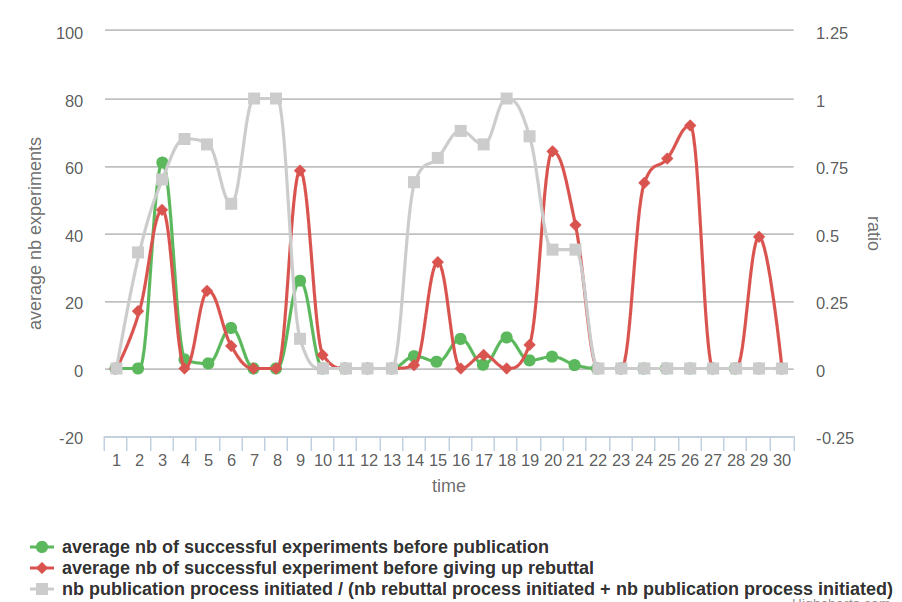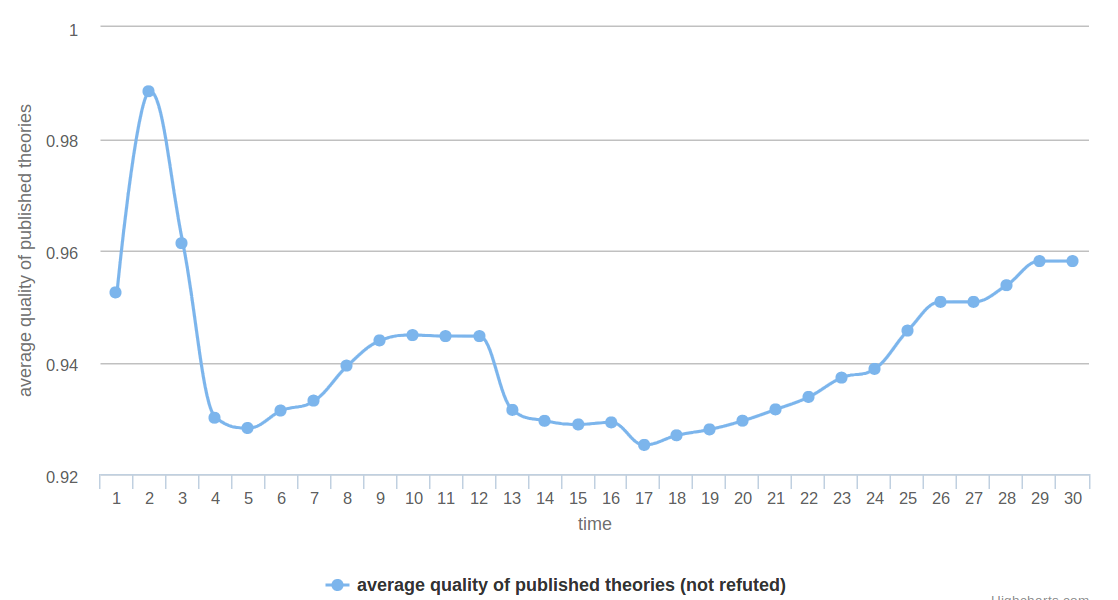Tuesday 23th Sept. 2014
Game of the Day Open Science
Nobel of the Day

Roberto Catini, IMT
Open Science Winner and Nobel Game ECCS Ranking Winner
"for groundbreaking experiments on affective computing of cellular organizations."
Prizes
one book of your choice
at Cambridge Univ. Press stand

one book of your choice
at Cambridge Univ. Press stand
One book of your choice<
from the Springer Catalogue

from the Springer Catalogue
Analysis
Statistics over the whole game period :- average nb of successful experiments before publication = 12.51
- average nb of successful experiment before giving up rebuttal = 74.44
- nb publication process initiated / (nb rebuttal process initiated + nb publication process initiated) = 0.57
History of the play
If we were to built a narrative from this play, we could say something like this :"This game with 28 participants had lots of twists but still follows one of the typical patterns of Open stuffs. There is a good balance between publication processes and refutation processes with medium quality publications and high quality refutation : some people take the liberty to publish lots of things without checking much what they are doing. This leads to temporaty low quality production. However, their work is quickly checked by people from the community, which progressively cure their work. This teaches the newbies to be more carefull when publishing stuff.
Finally, the highest score, reputation or what so ever, goes to people which demonstrate their capacity to enhance the quality of what has been proposed by the community.
In particular, the winner of this game published almost nothing nor tried to explicitly falsify others ; but build its own expertise of the field in exploring various theories, which allowed him to immediately falsify people when they published crap."



Which were the true theories of that world ?
- affective computing of cellular organization
- astrobiology of boolean satisfiability
- cell tracking of distributed systems
- community detection of artificial creatures
- cosmic magnetic fields of control of spatial processes
- design of experiments of extreme times
- discourse analysis of microbiology
- ecological complexity of autonomy
- ecological networks of genetic diversity
- expression of emotions of cardiac imaging
- genetic regulation of foams
- graph management of environmental studies
- multi-stability of cluster analysis
- multirobot teams of evolutionary simulation
- epidemic processes of biological clocks
- escience of e-government
- evolvability of cross-border regions
- mechanism design of energy landscape
- consanguinity of molecular biology
- generating functions of language
- multicellular systems of information retrieval
- arthritis of cosmology
- artificial life of markov fields
- astronomy of environmental science
- biological development of diffusion tensor imaging
- boolean function of amino acids metabolism
- chondrocyte of biomechanics
- cirrhosis of autonomous mobile robots
- citation networks of human mobility
- complex organizations of memes
- data-driven modeling of computational finance
- emergency response of inverse methods
- engineering design of metrology
- extreme times of autonomic computing
- functional connectivity of civil war
- human behavior of graph analysis
- information design of contact line dynamics
- integrative biology of ecosystem services
- low-dimensional chaos of light-matter interaction
- macroeconomy of customer service management
- markov chain analysis of evolutionary simulation
- multidisciplinary knowledge of dynamic self-organization
- multilevel dynamics of activity patterns
- multilevel representation of medical technology
- neolithic of epidemic processes
- biological evolution of network planning
- cognitive disorders of complex systems modelling
- computational physics of collective animal behavior
- distributed systems of dna evolution
- evolution of mutation rates of artificial chemistry
- evolutionary game theory of multicellular systems
- exclusion processes of comparative genomics
- global dynamics of artificial life
- bioorganic chemistry of long-range dependencies
- control systems of mobile agent
- crop model of group processes
- earthquakes of ant algorithms
- electricity networks of ad hoc networks
- food security of global dynamics
- frontal function of land planning
- general systems theory of data-driven
- genetic regulatory networks of computational social choice
- grid computing of group processes
- group collaboration of complex computer simulations
- hamiltonian of climate networks
- mind-body of cell division cycle
- multiplexed networks of kinship
- biosensors of fuzzy logic
- forest economics of economic patterns
- matthew effect of dissipative solitons
